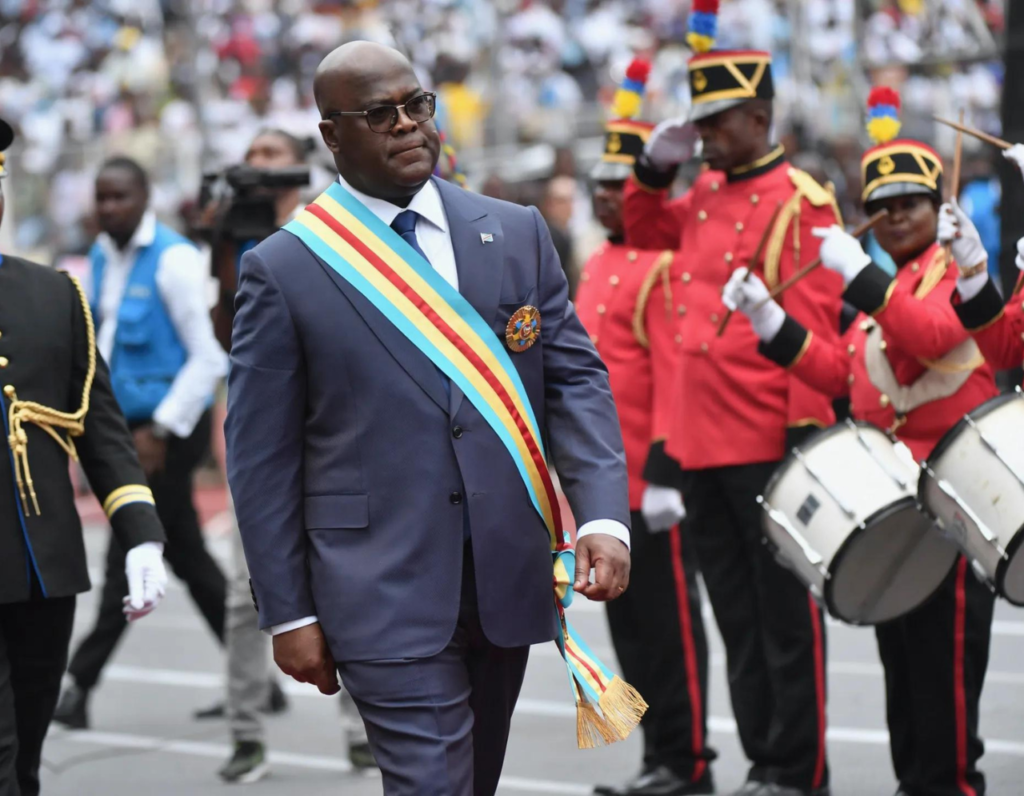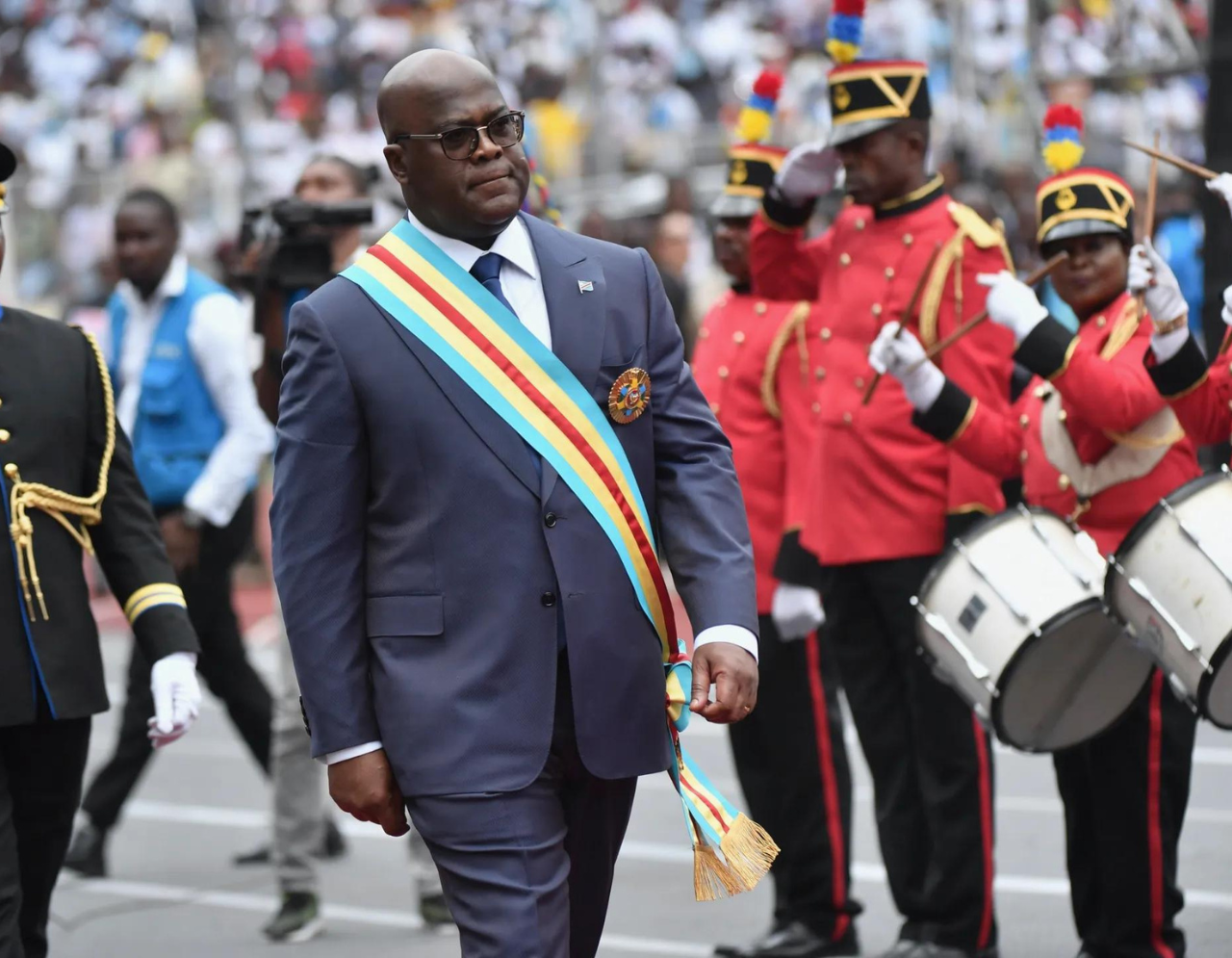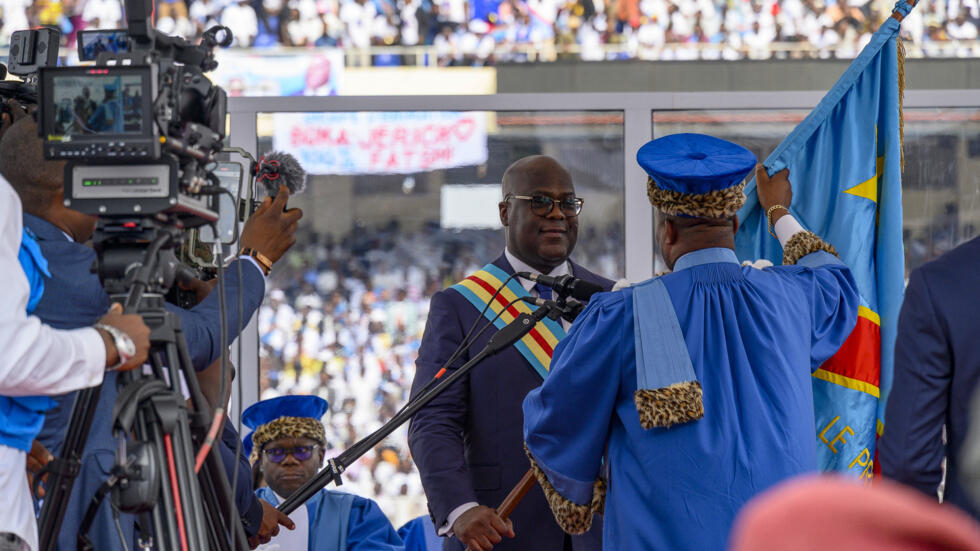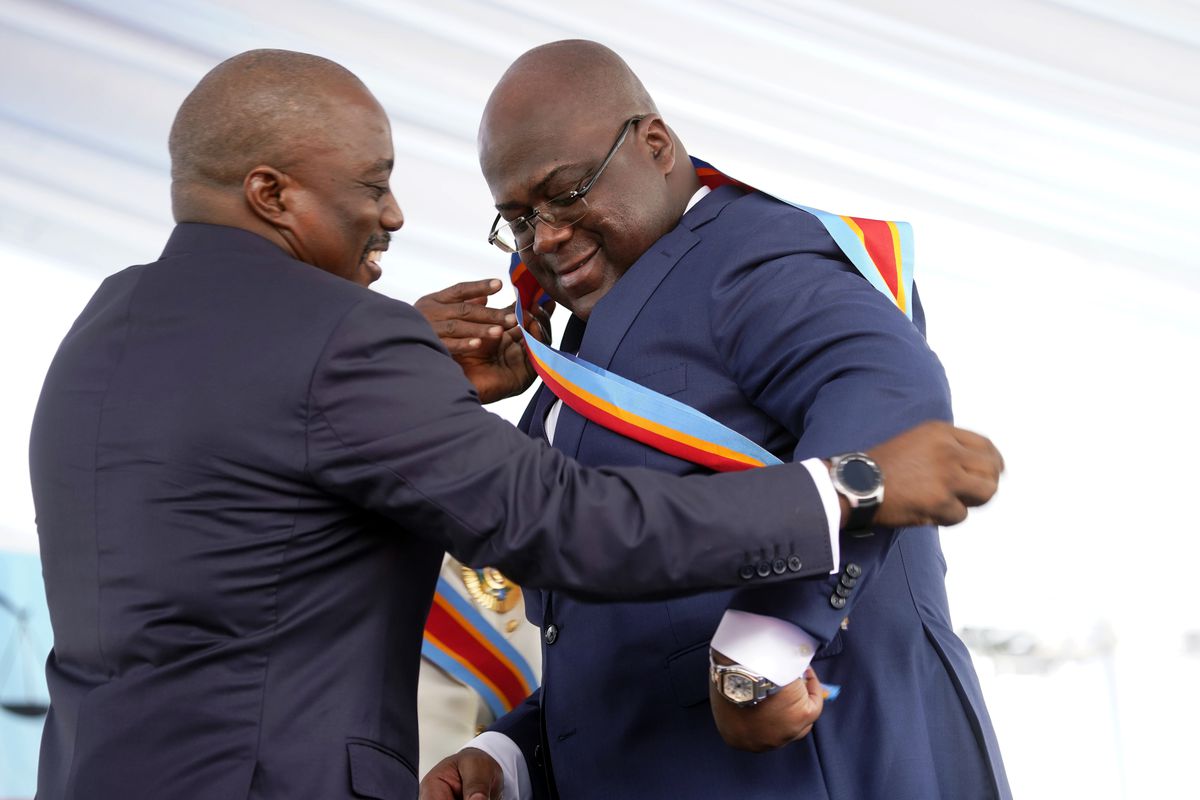President Tshisekedi’s Second Inauguration Amidst Controversy in DR Congo

In a significant political event for the Democratic Republic of Congo, President Felix Tshisekedi has recently been sworn in for his second term. This inauguration follows a decisive victory in the December elections, where President Tshisekedi secured a commanding lead. However, this win is not without controversy, as several opposition candidates have raised disputes over the election results.
This inauguration marks a crucial juncture in Congo’s political landscape, setting the stage for President Tshisekedi’s next five years in office. Amidst the backdrop of these disputes, the ceremony and the reactions it has garnered reflect the complex and dynamic nature of Congolese politics. As we delve into the details of this event, we’ll explore what this second term might hold for President Tshisekedi and the nation he leads.

Tshisekedi’s Second Term: Promises and Expectations
As President Felix Tshisekedi steps into his second term, he carries with him a vision for a united, stronger, and more prosperous Congo. His inauguration speech not only celebrated his recent victory but also set the tone for what lies ahead in his presidency. Here’s a closer look at the key commitments and expectations that define Tshisekedi’s agenda for his second term:
- Building a United Congo: Tshisekedi emphasizes the importance of national unity. He envisions a Congo where diverse communities work together towards common goals, overcoming regional and ethnic divides.
- Economic Growth and Tackling Unemployment: A major focus of his term is on boosting the economy and reducing unemployment. With a young and growing population, creating job opportunities is crucial for the nation’s stability and growth.
- Empowering the Youth: Recognizing the potential of the youth, Tshisekedi is committed to policies and programs that empower young Congolese. This includes education, skill development, and creating platforms for youth to contribute to national development.
- Advancing Women’s Rights: Gender equality and women’s rights are on Tshisekedi’s agenda. He acknowledges the need for policies that support women’s participation in all spheres of Congolese society, from politics to the workforce.
- Promoting National Cohesion: Amidst the challenges of regional conflicts and political divisions, Tshisekedi’s term aims to foster a sense of national cohesion, bringing together various factions and communities under a shared vision for Congo.
President Tshisekedi’s second term comes at a time when DR Congo faces numerous challenges, both internally and externally. His ability to deliver on these promises will be closely watched by both his supporters and critics, as the nation seeks to move forward on a path of stability and prosperity.
The Inauguration Ceremony: A Festive Affair

The inauguration ceremony of President Felix Tshisekedi for his second term was a vibrant and festive affair, showcasing the rich cultural tapestry of the Democratic Republic of Congo. Held at the Martyrs sports stadium in Kinshasa, the event was not just a political formality but a celebration of Congolese spirit and resilience.
The Martyrs sports stadium, known for its grandeur, was the chosen venue for this significant event. The stadium, with its vast capacity, was filled to the brim, turning into a melting pot of excitement and anticipation.
The ceremony was graced by the presence of numerous African heads of state and traditional chiefs, reflecting the importance of this event on a continental scale. Their presence underscored the diplomatic ties and the support Congo enjoys from its African neighbors.
The air was charged with a celebratory mood, as attendees engaged in singing and dancing, typical of Congolese cultural expressions. The atmosphere was not just about celebrating the inauguration but also about expressing national pride and unity. The music and dance added a layer of joy and community spirit to the formal proceedings.
This inauguration ceremony went beyond the swearing-in of a president; it was a testament to the country’s journey, its challenges, and its hopes for the future. It was a moment where politics met culture, and the result was a vivid display of Congo’s identity and aspirations.
Election Controversies and Opposition Challenges

President Felix Tshisekedi’s second inauguration comes against the backdrop of an election that was both a significant victory and a source of controversy. Winning over 70% of the vote, Tshisekedi’s triumph was clear, but it wasn’t without its challenges and disputes.
- A Decisive Victory: In the December elections, President Tshisekedi secured a commanding majority, with more than 70% of voters supporting his candidacy. This landslide victory underscored his popularity and the trust placed in him by a significant portion of the Congolese population.
- Opposition’s Rejection of Results: However, this victory was not universally accepted. Key opposition figures raised concerns about the fairness and transparency of the election process. They cited instances of fraud and logistical issues that they believed compromised the integrity of the election.
- Stance of Opposition Leaders: Prominent opposition leaders like Moise Katumbi and Martin Fayulu were vocal in their rejection of the election results. They argued that the reported irregularities and alleged fraud undermined the democratic process. Their stance resonated with a section of the populace, leading to a divided opinion on the election’s outcome.
The controversies surrounding the election highlight the complexities of democratic processes in DR Congo. While Tshisekedi’s victory is a testament to his political strength, the opposition’s challenges underscore the ongoing debates about governance and electoral integrity in the country.
Public Reaction and Security Concerns
The aftermath of President Tshisekedi’s second inauguration and the preceding elections has been marked by a mix of public reactions and security concerns, particularly in regions like Goma and Beni. These responses reflect the divided sentiments among the Congolese population regarding the election results.
- Protests in Key Regions: In areas such as Goma and Beni, there have been reports of public protests and expressions of discontent. These protests are indicative of the skepticism and dissatisfaction felt by a segment of the population, particularly supporters of the opposition.
- Security Forces’ Response: In response to these protests, security forces have been deployed to maintain order and ensure public safety. Their presence and actions are crucial in managing the unrest and preventing any escalation of violence.
- Electoral Commission’s Role: Amidst these tensions, the role of the electoral commission has come under scrutiny. The commission is tasked with addressing the allegations of fraud and voting irregularities raised by the opposition. Their handling of these allegations is critical in restoring public trust and upholding the integrity of the electoral process.
The situation underscores the challenges facing DR Congo in the wake of the elections. Balancing public expression with security concerns and ensuring a transparent resolution to electoral disputes are key to maintaining stability and democratic norms in the country.
ALSO READ:African Leaders Unite Against Israel’s Military Actions in Gaza
Conclusion on President Tshisekedi’s Second Inauguration Amidst Controversy in DR Congo
As President Felix Tshisekedi embarks on his second term following a momentous inauguration, the Democratic Republic of Congo stands at a critical crossroads. This period is not just significant for Tshisekedi’s presidency but also for the future trajectory of the nation.
- A Time of Hope and Expectation: Tshisekedi’s second term brings with it a renewed sense of hope. His promises of a united, stronger, and prosperous Congo have resonated with many. However, the real test lies in turning these promises into tangible improvements for the Congolese people.
- Navigating Challenges Ahead: The road ahead is fraught with challenges. Fulfilling election promises, especially in areas like economic development, youth empowerment, and national cohesion, will require strategic planning and steadfast commitment. Moreover, addressing the concerns and skepticism of the opposition and their supporters is crucial for national unity.
- Maintaining National Stability: Perhaps the most significant challenge will be maintaining stability in a country with a history of political and social unrest. The role of the government, security forces, and electoral bodies in upholding democratic principles and ensuring transparency will be pivotal in this regard.
President Tshisekedi’s second term represents both an opportunity and a test for DR Congo’s democracy and development. How he navigates these challenges and meets the expectations of his presidency will be closely watched by both national and international observers, as DR Congo continues to chart its course in the global arena.







Responses